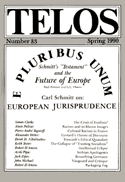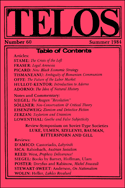By Wolfgang Thierse · Friday, March 12, 2021 The following essay was originally published in the Frankfurter Allgemeine Zeitung on February 22, 2021, and appears here in translation with permission of the author. Translated by Russell A. Berman, with comments here.
To read more in depth from Telos, subscribe to the journal here.
Community membership used to be a matter of religion and, after that, ideology. Today this function has been taken over by the concept of identity. Religion and ideology in the past led repeatedly to serious and even bloody conflicts. Will this history repeat itself under the new principle? Themes of cultural membership seem to be rattling our Western societies increasingly, splitting them along the political lines of distributive justice. Questions of identity—ethnic, gender, sexual—dominate, as the debates over racism, postcolonialism, and gender grow violent and aggressive. These are probably unavoidable confrontations in an increasingly pluralistic society, just as they give expression to social conflicts, fought over the distribution of visibility and influence, attention and recognition.
As unavoidable as these conflicts may seem, they are also confusing, opaque, and ambivalent. The violence of some attacks against traditionalist positions, as well as the violence in the defense of tradition, in addition to the radicalness of identity demands lead to the question: How much identity politics strengthens the pluralism of a society, and at what point does it turn into fragmentation? The principle at stake is this: the ethnic, cultural, and religious-worldview pluralism that is growing in Germany as elsewhere is no idyll; on the contrary it is full of disputes and conflict potential. If this multifacetedness is to be lived out in a peaceful manner, then pluralism must be more than the mere coexistence of minorities and identities that not only differ from each other but also separate from each other. Fundamental commonalities are necessary, including of course a common language, and naturally also a shared recognition of justice and law.
Continue reading →
By Russell A. Berman · Friday, March 12, 2021 To read more in depth from Telos, subscribe to the journal here.
Former President of the German Bundestag Wolfgang Thierse mounts a powerful argument against identity politics in Germany and their political consequences. His comments here and originally here have elicited a robust discussion in Germany, especially because the current leaders of the Social Democratic Party (SPD), of which Thierse is a long-term member, reportedly responded that they felt ashamed at his “regressive” views. While the leadership represents the current left wing of the party, other voices from the center rallied to Thierse’s defense. At stake is the gap between alternative aspirations within this venerable party, once the foundational political organization of the German left with roots in the workers’ movement of the nineteenth century.
Continue reading →
By Johanna K. Schenner · Thursday, October 31, 2013 As an occasional feature on TELOSscope, we highlight a past Telos article whose critical insights continue to illuminate our thinking and challenge our assumptions. Today, Johanna Schenner looks at Simon Clarke’s “The Crisis of Fordism or the Crisis of Social Democracy?” from Telos 83 (Spring 1990).
 Simon Clarke’s “The Crisis of Fordism or the Crisis of Social Democracy?” deals with the need to develop different economic strategies as the interventionist welfare state underwent many challenges and crises in the 1980s. The crumbling of communism further supported the idea that weak state interventionism often could not reach its stipulated economic goals. In comparison to the socialist critique of the state, the political right put forward measures and tools such as privatization to support its critique of the state by the following means: first, by focusing on the selective redistribution of income; and second, by bringing about a particular kind of Keynesian economic policy featuring military characteristics (73). The economic growth came to an end in 1987 when a global panic about the massive credit boom begun under Reagan and Thatcher broke wide open. Still, the right’s policies reached a new height with the waves of radical liberalization in the former communist countries as well as in the Third World. Clarke, however, expresses severe doubts about this strategy being the solution to neoliberalism’s economic strategy crisis (79). Simon Clarke’s “The Crisis of Fordism or the Crisis of Social Democracy?” deals with the need to develop different economic strategies as the interventionist welfare state underwent many challenges and crises in the 1980s. The crumbling of communism further supported the idea that weak state interventionism often could not reach its stipulated economic goals. In comparison to the socialist critique of the state, the political right put forward measures and tools such as privatization to support its critique of the state by the following means: first, by focusing on the selective redistribution of income; and second, by bringing about a particular kind of Keynesian economic policy featuring military characteristics (73). The economic growth came to an end in 1987 when a global panic about the massive credit boom begun under Reagan and Thatcher broke wide open. Still, the right’s policies reached a new height with the waves of radical liberalization in the former communist countries as well as in the Third World. Clarke, however, expresses severe doubts about this strategy being the solution to neoliberalism’s economic strategy crisis (79).
Continue reading →
By Johanna K. Schenner · Tuesday, July 2, 2013 As an occasional feature on TELOSscope, we highlight a past Telos article whose critical insights continue to illuminate our thinking and challenge our assumptions. Today, Johanna Schenner looks at Federico Stame’s “The Crisis of the Left and New Social Identities,” from Telos 60 (Summer 1984).
 In “The Crisis of the Left and New Social Identities” (1984), Federico Stame addresses the problems encountered by left-wing ideologies and political parties, such as the banality of their demands, as well as deeper underlying issues, such as the falling away of the friend-foe nexus in politics. He also provides hope for improvement by invoking the leading role of new social identities in renewing the tradition of the political Left. In “The Crisis of the Left and New Social Identities” (1984), Federico Stame addresses the problems encountered by left-wing ideologies and political parties, such as the banality of their demands, as well as deeper underlying issues, such as the falling away of the friend-foe nexus in politics. He also provides hope for improvement by invoking the leading role of new social identities in renewing the tradition of the political Left.
Continue reading →
|
|
 Simon Clarke’s “The Crisis of Fordism or the Crisis of Social Democracy?” deals with the need to develop different economic strategies as the interventionist welfare state underwent many challenges and crises in the 1980s. The crumbling of communism further supported the idea that weak state interventionism often could not reach its stipulated economic goals. In comparison to the socialist critique of the state, the political right put forward measures and tools such as privatization to support its critique of the state by the following means: first, by focusing on the selective redistribution of income; and second, by bringing about a particular kind of Keynesian economic policy featuring military characteristics (73). The economic growth came to an end in 1987 when a global panic about the massive credit boom begun under Reagan and Thatcher broke wide open. Still, the right’s policies reached a new height with the waves of radical liberalization in the former communist countries as well as in the Third World. Clarke, however, expresses severe doubts about this strategy being the solution to neoliberalism’s economic strategy crisis (79).
Simon Clarke’s “The Crisis of Fordism or the Crisis of Social Democracy?” deals with the need to develop different economic strategies as the interventionist welfare state underwent many challenges and crises in the 1980s. The crumbling of communism further supported the idea that weak state interventionism often could not reach its stipulated economic goals. In comparison to the socialist critique of the state, the political right put forward measures and tools such as privatization to support its critique of the state by the following means: first, by focusing on the selective redistribution of income; and second, by bringing about a particular kind of Keynesian economic policy featuring military characteristics (73). The economic growth came to an end in 1987 when a global panic about the massive credit boom begun under Reagan and Thatcher broke wide open. Still, the right’s policies reached a new height with the waves of radical liberalization in the former communist countries as well as in the Third World. Clarke, however, expresses severe doubts about this strategy being the solution to neoliberalism’s economic strategy crisis (79).  In “The Crisis of the Left and New Social Identities” (1984), Federico Stame addresses the problems encountered by left-wing ideologies and political parties, such as the banality of their demands, as well as deeper underlying issues, such as the falling away of the friend-foe nexus in politics. He also provides hope for improvement by invoking the leading role of new social identities in renewing the tradition of the political Left.
In “The Crisis of the Left and New Social Identities” (1984), Federico Stame addresses the problems encountered by left-wing ideologies and political parties, such as the banality of their demands, as well as deeper underlying issues, such as the falling away of the friend-foe nexus in politics. He also provides hope for improvement by invoking the leading role of new social identities in renewing the tradition of the political Left. 

